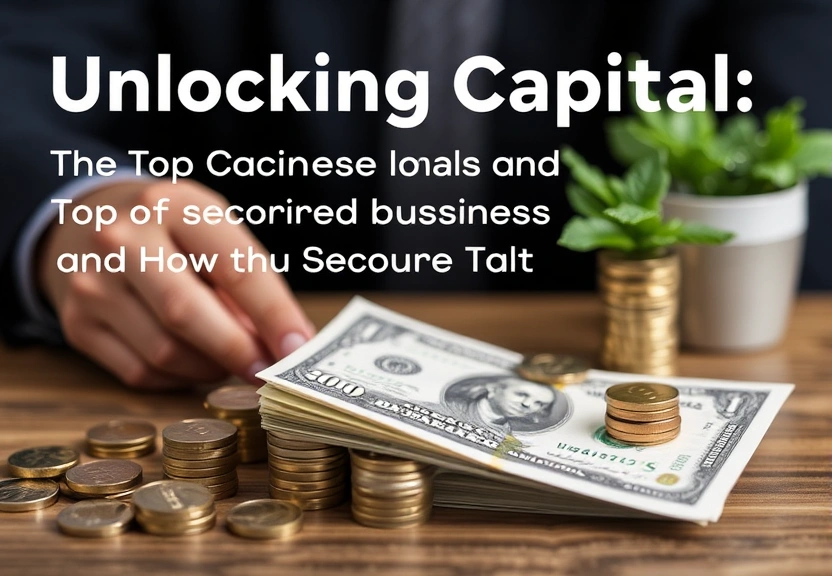Unlocking Capital: The Top Unsecured Business Loans and How to Secure Yours
In today’s fast-paced business landscape, small business owners often find themselves in need of quick access to capital to seize opportunities or manage unexpected expenses. Unsecured business loans have emerged as a viable solution, allowing entrepreneurs to obtain the necessary funding without the burden of providing physical collateral such as equipment, inventory, or property. This article delves into the top unsecured business loans available, their benefits, and practical tips on how to secure yours.

Understanding the nuances of unsecured business loans is crucial for any business owner looking to maintain financial flexibility. These loans not only provide immediate cash flow but also enable you to focus on growing your business without the risk of losing valuable assets. With various financing options now available, navigating the world of unsecured loans can be daunting. However, with the right information and strategy, you can unlock the capital your business needs to thrive.
What Are Unsecured Business Loans?
Unsecured business loans are financing options that do not require borrowers to put up physical assets as collateral. Unlike secured loans, which involve pledging property or equipment to mitigate the lender’s risk, unsecured loans rely on the creditworthiness of the borrower and their business. This means that even if you lack significant assets, you can still access the funds you need to operate and grow your business.
Key Characteristics of Unsecured Business Loans
- No Collateral Required: As the name suggests, these loans do not require you to secure them with physical assets.
- Higher Interest Rates: Since lenders face a greater risk with unsecured loans, they often come with higher interest rates compared to secured loans.
- Faster Approval Times: The application process for unsecured loans is generally quicker, allowing for faster access to funds.
- Flexible Use of Funds: Borrowers can utilize the funds for a variety of purposes, including marketing, payroll, or inventory purchases.
Top Unsecured Business Loans Available
There are numerous unsecured business loan options available in the market today. Understanding the different types of loans can help you choose the best fit for your specific business needs. Here’s a rundown of some of the top unsecured business loans:
1. Term Loans
Term loans are one of the most common forms of unsecured business financing. They provide a lump sum of money that you repay over a fixed period, usually with a fixed interest rate. The repayment terms can range from one to five years, making them suitable for both short-term and medium-term financial needs.
2. Business Lines of Credit
A business line of credit provides flexible access to funds up to a predetermined limit. You only pay interest on the amount you withdraw, making it an excellent option for businesses with fluctuating capital needs. This type of financing is ideal for covering operational costs or unexpected expenses.
3. Merchant Cash Advances
A merchant cash advance allows business owners to receive a lump sum of cash in exchange for a percentage of future credit card sales. While this option can provide quick access to capital, it often comes with high fees and interest rates, making it essential to evaluate the cost-effectiveness before proceeding.
4. Peer-to-Peer Lending
Peer-to-peer lending platforms connect individual lenders with borrowers, allowing businesses to secure funding without going through traditional financial institutions. This option can provide competitive interest rates and flexible repayment terms, but it’s essential to choose a reputable platform.
How to Secure Your Unsecured Business Loan
Securing an unsecured business loan can be a straightforward process, but it requires careful planning and preparation. Here are some essential steps to ensure you successfully obtain the funding you need:
1. Assess Your Financing Needs
Before applying for a loan, determine exactly how much capital you need and how you plan to use it. This assessment will help you choose the right type of loan and ensure you borrow only what is necessary.
2. Check Your Credit Score
Your credit score is a critical factor that lenders consider when evaluating your loan application. A higher credit score can improve your chances of approval and secure better terms. Regularly check your credit report for any errors and take steps to improve your score if necessary.
3. Prepare Your Financial Documents
To streamline the application process, gather all necessary financial documents, including tax returns, bank statements, and profit-and-loss statements. Lenders will want to assess your business’s financial health, so having these documents ready can expedite your application.
4. Research Lenders and Compare Options
Different lenders may offer varying terms, interest rates, and fees. Take the time to research multiple lenders and compare their offerings to find the best deal for your business. Consider both online lenders and traditional banks to maximize your options.
5. Submit Your Application
Once you’ve chosen a lender and prepared your documents, it’s time to submit your application. Be thorough and truthful in your disclosures, as discrepancies can lead to delays or denials. After submission, be prepared for potential follow-up questions from the lender.
Important Considerations When Choosing Unsecured Business Loans
While unsecured business loans can provide essential funding, it’s crucial to consider several factors before finalizing your decision:
- Interest Rates: Compare interest rates across lenders to identify the most affordable option.
- Fees: Be aware of any hidden fees, such as origination fees or prepayment penalties, which can increase the overall cost of the loan.
- Repayment Terms: Look for flexible repayment terms that align with your cash flow and business operations.
- Lender Reputation: Research the lender’s reputation by checking reviews and ratings to ensure you are working with a trustworthy institution.
Frequently Asked Questions (FAQs)
1. What is the difference between secured and unsecured business loans?
Secured business loans require collateral, while unsecured loans do not. This means that with unsecured loans, you do not risk losing assets if you are unable to repay the loan.
2. How can I improve my chances of getting approved for an unsecured loan?
Improving your credit score, providing accurate financial documents, and demonstrating a solid business plan can enhance your chances of approval.
3. Are unsecured business loans suitable for startups?
Yes, many lenders offer unsecured loans specifically designed for startups, although the terms may be different due to the higher perceived risk.
4. What can I use an unsecured business loan for?
Unsecured loans can be used for various purposes, including inventory purchases, marketing, operational expenses, and hiring staff.
5. Can I pay back an unsecured loan early?
Many lenders allow early repayment without penalties, but it’s essential to review the loan agreement to confirm this before proceeding.
Conclusion
Unsecured business loans provide a valuable financing option for entrepreneurs looking to access capital without the burden of collateral. By understanding the different types of unsecured loans available, preparing your application meticulously, and considering key factors, you can successfully secure the funding you need to propel your business forward. Remember to do your due diligence, compare options, and choose a loan that aligns with your financial goals to ensure a positive borrowing experience. With the right approach, unlocking capital through unsecured business loans can be a significant step towards achieving your business aspirations.
📰 Original Source
Este artigo foi baseado em informações de: https://www.nerdwallet.com/article/small-business/unsecured-business-loans


